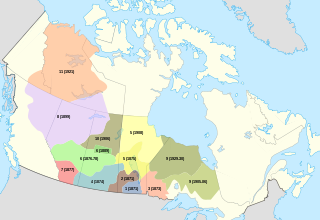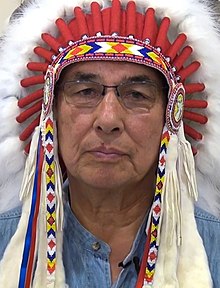
The Canadian Indian residential school system was a network of boarding schools for Indigenous peoples. The network was funded by the Canadian government's Department of Indian Affairs and administered by Christian churches. The school system was created to isolate Indigenous children from the influence of their own culture and religion in order to assimilate them into the dominant Canadian culture. Over the course of the system's more than hundred-year existence, around 150,000 children were placed in residential schools nationally. By the 1930s, about 30 percent of Indigenous children were attending residential schools. The number of school-related deaths remains unknown due to incomplete records. Estimates range from 3,200 to over 30,000, mostly from disease.

Treaty 6 is the sixth of the numbered treaties that were signed by the Canadian Crown and various First Nations between 1871 and 1877. It is one of a total of 11 numbered treaties signed between the Canadian Crown and First Nations. Specifically, Treaty 6 is an agreement between the Crown and the Plains and Woods Cree, Assiniboine, and other band governments at Fort Carlton and Fort Pitt. Key figures, representing the Crown, involved in the negotiations were Alexander Morris, Lieutenant Governor of Manitoba and The North-West Territories; James McKay, The Minister of Agriculture for Manitoba; and William J. Christie, a chief factor of the Hudson's Bay Company. Chief Mistawasis and Chief Ahtahkakoop represented the Carlton Cree.

Indigenous police services in Canada are police forces under the control of a First Nation or Inuit government.
The North American Indigenous Games is a multi-sport event involving indigenous North American athletes staged intermittently since 1990. The games are governed by the North American Indigenous Games Council, a 26-member council of representatives from 13 provinces and territories in Canada and 13 regions in the United States.

Maskwacis, renamed in 2014 from Hobbema, is an unincorporated community in central Alberta, Canada at intersection of Highway 2A and Highway 611, approximately 70 kilometres (43 mi) south of the City of Edmonton. The community consists of two Cree First Nations communities – one on the Ermineskin 138 reserve to the north and the other on the Samson 137 reserve to the south. It also consists of an adjacent hamlet within Ponoka County. The community also serves three more nearby First Nations reserves including Samson 137A to the south, Louis Bull 138B to the northwest, and Montana 139 to the south.
The association between the monarchy of Canada and Indigenous peoples in Canada stretches back to the first interactions between North American Indigenous peoples and European colonialists and, over centuries of interface, treaties were established concerning the monarch and Indigenous nations. First Nations, Inuit, and Métis peoples in Canada have a unique relationship with the reigning monarch and, like the Māori and the Treaty of Waitangi in New Zealand, generally view the affiliation as being not between them and the ever-changing Cabinet, but instead with the continuous Crown of Canada, as embodied in the reigning sovereign.

The Truth and Reconciliation Commission of Canada was a truth and reconciliation commission active in Canada from 2008 to 2015, organized by the parties of the Indian Residential Schools Settlement Agreement.
Ermineskin Cree Nation also known as the Ermineskin Tribe, is a Cree First Nations band government in Alberta, Canada. A signatory to Treaty 6, Ermineskin is one of the Four Nations of Maskwacis, Alberta's largest Indigenous community.
The following is an alphabetical list of topics related to Indigenous peoples in Canada, comprising the First Nations, Inuit and Métis peoples.

Qu'Appelle Indian Residential School (Q.I.R.S.) or Qu'Appelle Industrial School was a Canadian residential school in the Qu'Appelle Valley, Saskatchewan. As one of the early residential schools in western Canada, it was operated from 1884 to 1969 by the Roman Catholic Church for First Nations children and was run by the Missionary Oblates of Mary Immaculate and the Grey Nuns. As of November 8, 2021 Star Blanket Cree Nation started searching for unmarked graves using ground-penetrating radar.
Chief Robert (Bobtail) Smallboy, Cree name Keskayo Apitchitchiw, was a community leader who brought national attention to problems faced by urban and reserve Indians when he "returned to the land" with followers from troubled Canadian Indian reservations. He was born while his parent s were "in transit" through the Peigan Nation, SW of Fort Macleod, Alta on 7 November 1898, en route to his father's home in what was to become the Rocky Boy Reservation in Montana, named after Bobtail's paternal grandfather. Bobtail spent his formative years there, long enough to speak Cree with a noticeable Chippewa accent. During the first world war, the Smallboys were among the last to settle on their allotted reserve at Hobbema in central Alberta, a Treaty 6 nation now known for its rich oil and gas reserves. Smallboy became a hunter, trapper, farmer, and eventually chief of the Ermineskin Band from 1959 to 1969. In 1968, to escape deteriorating social and political conditions on the reserve, he moved to a bush camp on the Kootenay Plains. He attributed the alcoholism, drug abuse and suicide that he saw in his community to an attempt to live a modern lifestyle on the reserve rather than "The Indian Way". Accompanied by approximately 125 people and with help from other elders he moved his community. Despite factional splits, the return of many residents to Hobbema, and the group's failure to obtain permanent land tenure, Smallboy Camp persisted into the 21st Century as a working community used as a retreat by Plains and Woodlands Indians from western Canada and the US.

Janice Forsyth is a Canadian associate professor of Sociology and the director of the Indigenous Studies program at Western University in London, Ontario. A former varsity athlete Forsyth was awarded the Tom Longboat Regional Award for Ontario in 2002.

The National Day for Truth and Reconciliation, originally and still colloquially known as Orange Shirt Day, is a Canadian holiday to recognize the legacy of the Canadian Indian residential school system.
Herbert Strongeagle is considered "a role model for 'breaking the stereotype, myths and perception of Native people that is constantly reinforced by hockey people and the media" by his community, and in 2006 received the First Nations Lifetime Achievement Award - Saskatchewan. Early in his life he was awarded the Tom Longboat Medal as Best Indian Athlete in Saskatchewan for his contributions to his junior baseball and midget and juvenile hockey teams, along with track and field and basketball, and continued to receive awards from his community for contributions through his lifetime.
Roy Little Chief was a Canadian Siksika elder and former Chief of the Siksika Nation from 1981 to 1983. He was a longtime activist for the rights of First Nations and indigenous people in Canada.
Danika Billie Rose Littlechild of the Ermineskin Cree Nation, was born and raised in Maskwacis, Alberta, Canada. She served as the vice president of the Canadian Commission for UNESCO in 2014. She is a lawyer and activist for cultural diversity and recognition of Indigenous rights.
St. Joseph's Mission was a Roman Catholic mission established near Williams Lake, British Columbia in 1867. The mission was operated by the Missionary Oblates of Mary Immaculate. It is primarily known for the notorious St. Joseph's Indian Residential School located on the property, a part of the Canadian Indian residential school system that operated on the Mission from 1891 to 1981.
Phyllis Jack Webstad is a Northern Secwepemc (Shuswap) author from the Stswecem'c Xgat'tem First Nation, and the creator of Orange Shirt Day, a day of remembrance marked in Canada later instated as the public holiday of National Day for Truth and Reconciliation. She is a First Nations residential school survivor. She has written multiple books, including a picture book depicting her experience with the Indian residential school system.

Pope Francis visited Canada from July 24 to 29, 2022, with stops in the provinces of Alberta and Quebec and the territory of Nunavut. The trip mainly focused on apologizing for the Catholic Church's role in the Canadian Indian residential school system and on reconciliation with the country's Indigenous peoples. It was the first papal visit to Canada since 2002, when Pope John Paul II visited Toronto for World Youth Day.

William Morin IV known as Billy Morin is a Canadian Cree First Nations leader and was the elected Chief of Enoch Cree Nation from August 2015 to June 2022. He has built partnerships among Indigenous and non-Indigenous groups toward economic and social prosperity and reconciliation.










